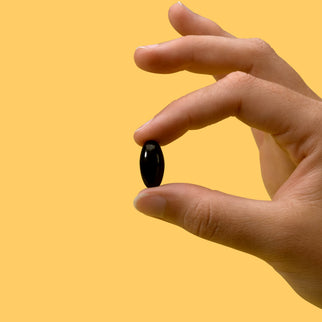To many of us, memories are some of the most valuable things that we have. Therefore, we should go to great lengths to protect them. Fortunately, by prioritizing our health and being mindful of how we support our brain through our daily habits, we can maintain a healthy memory even as we age.
In the search for ways to preserve a healthy memory, fish oil supplements are often mentioned as an appropriate solution. So does fish oil actually benefit your memory? In breaking down the science behind how fish oil affects your memory, you can learn more about your various options and determine how you should structure your daily nutrition.
How Does Memory Work?
Memory is a complex process and involves multiple parts of the brain. Memory also works in different ways, helping us to recall events that happened years ago to those that happened seconds ago. The different types of memory that work in the brain are:
- Explicit memory: This type of memory refers to long-term memories of events that we experience, often referred to as episodic or autobiographical memories. Explicit memory can also include general knowledge and facts that we remember.
- Implicit memory: Implicit memory manages habits and motor functions, like playing an instrument or playing sports.
- Working memory: This form of memory is focused on the short-term, helping you to remember what tasks you are engaging in and things that just happened.
Most of your explicit memories are stored in a part of the brain called the hippocampus, which holds onto events that you experienced. However, the neocortex and amygdala can also play a role in storing some forms of explicit memory, like general knowledge. Meanwhile, the basal ganglia and cerebellum support implicit memory, and the prefrontal cortex has the biggest role in supporting working memory.
As with most parts of the body, over time, these parts of the brain can wear down, making it more difficult to retain memories. Explicit memory is often the most vulnerable to wearing down as we age, leading to memory loss.
How Does Fish Oil Support the Memory?

Fish oil is a supplement made by extracting the oil from the tissues of fatty, oily fish like mackerel, salmon, sardines, and more. These supplements can either come in the form of oil-filled capsules or in a bottle of oil that you can consume directly.
People take fish oil as a dietary supplement for a wide range of potential benefits, from supporting a healthy heart to promoting healthy joint function, thanks to the high levels of omega-3. On top of its many other possible benefits, fish oil has developed a reputation for supporting cognitive function and brain health, including motor skills and memory.
Fish oil contains two types of omega-3 fatty acids, called docosahexaenoic acid (DHA) and eicosapentaenoic acid (EPA). In general, omega-3 fats are important nutrients in the body, helping to support the construction of cell membranes and maintain positive interactions between cells. DHA and EPA long-chain fatty acids provide a range of possible health benefits, from supporting heart health to maintaining healthy joints.
DHA is found commonly in the retina and the brain, giving it a crucial role in our bodies. This function means that DHA is especially important during pregnancy and childhood when the brain and eyes are developing. The presence of DHA in our brain cells has significant implications for its potential to support our cognitive function as our brains develop and age.
Some experts have found that levels of DHA in the hippocampus decrease as we age, and these low levels can correlate with reduced learning ability, lower memory retention, and memory loss. As a result, making a conscious effort to consume DHA daily can help to support healthy levels of the essential fatty acid in the brain and thus maintain overall healthy cognitive function as we age.
In one study, DHA supplementation showed support for learning and memory function amongst participants.
The potential benefits of DHA also include supporting healthy neuron function. Although more studies need to be carried out on humans, the effects of omega-3 fatty acids on protecting neurons in aging rats have been promising.
Are Fish Oil Supplements the Best Option for Your Memory?
Although fish oil can provide some benefits for your memory, it is important to note that these benefits are not exclusive to fish oil. After all, the reason that fish oil may support your memory is its high DHA and EPA omega-3 content. Eating fish can also provide you with DHA and EPA, but the omega-3 content of different types of fish can vary widely, dining on seafood a less sure choice than other options to nourish your body with essential fats.
Besides, despite the benefits, fish also carries multiple drawbacks that make alternatives more appealing. For example, fish oil is not accessible to everyone, especially those who have allergies to seafood, follow a plant-based diet, or are concerned about marine contaminants like mercury. The taste and smell of these fatty fish are also simply unappealing to some people, leaving behind side effects like unpleasant fishy breath and smelly burps.
People who cannot eat fish often turn to other sources of omega-3s like flaxseeds, plant oil, and walnuts. However, these sources only contain a type of omega-3 called alpha-linolenic acid (ALA). Although ALA provides some potential health benefits, they still aren't a substitute for the other essential fats your body requires for normal functioning, DHA and EPA. Therefore, despite often being marketed as such, ALA sources of omega-3 are not comparable to fish oil and other options.
As a result, when looking for an alternative fish oil, you need to find an adequate substitute that provides both DHA and EPA. With few sources of these two fatty acids, finding a replacement can be a challenge. Fortunately, when you dig deeper, you can go past the fish to find out how they obtain their omega-3s — by eating the fascinating marine plant, algae. Algae contains both DHA and EPA, making it the perfect substitute for fish oil and the perfect addition to your daily nutrition.
How Algae Supplements Can Help Support Memory
With a high concentration of the two essential fatty acids, algae can offer the same potential health benefits as fish oil, if not more. Studies show that the omega-3 lipids from algae are absorbed 1.7 times better by the body than those found in fish or krill oil. This higher absorption rate means your body is able to put them to use more quickly and more efficiently. So when you consume algae supplements, you can trust that your body is making the most of the nutrients they provide.
Algae-based supplements are easier to adjust for different needs, especially when they are carefully and thoughtfully sourced. For example, when you take advantage ofiwi life omega-3 fatty acid supplements, you can find supplements tailored to your specific needs. iwi life’s Brain supplementhelps support a healthy brain and healthy cognitive function, while iwi life’s DHA supplements are an excellent choice for anyone looking to prioritize their DHA intake, especially for older adults.
How Else Can I Support My Memory?
Remember, your memory and brain are complex. Therefore, there is no fast track to guaranteeing a healthy memory. Although consuming omega-3s is one way to support a healthy memory, it is more effective when you take multiple measures to support your cognitive function in your everyday routine. Some of the other ways you can support your memory include:
- Exercising regularly
- Practicing a new skill, like playing an instrument or learning a language
- Incorporating fruits and vegetables into your diet
- Maintaining organization around your home and in your routine
- Socialize with others
- Maintain a healthy sleep schedule
Consume More Omega-3s for Your Memory

With the potential risks of age-related cognitive decline, it’s never too early to start working toward preserving your memory. Fish oil is a good option for providing you with omega-3s that can help promote the health of your memory, but it comes with several drawbacks. For an omega-3-rich supplement that can help support your cognitive function without the downsides of fish, you can rely on algae.
With iwi life algae-based omega-3 supplements, it is easy to ensure you are getting enough DHA and EPA omega-3s on a regular basis. By taking just one omega-3 soft gel each day, you know you are getting a full 250 mg of combined DHA and EPA. Try our algae-based supplements for yourself to support healthy brain function.
Sources:
Where are memories stored in the brain? | University of Queensland
Mechanisms of n-3 fatty acid-mediated development and maintenance of learning memory performance | PMC
Docosahexaenoic Acid and Adult Memory: A Systematic Review and Meta-Analysis | PMC





















